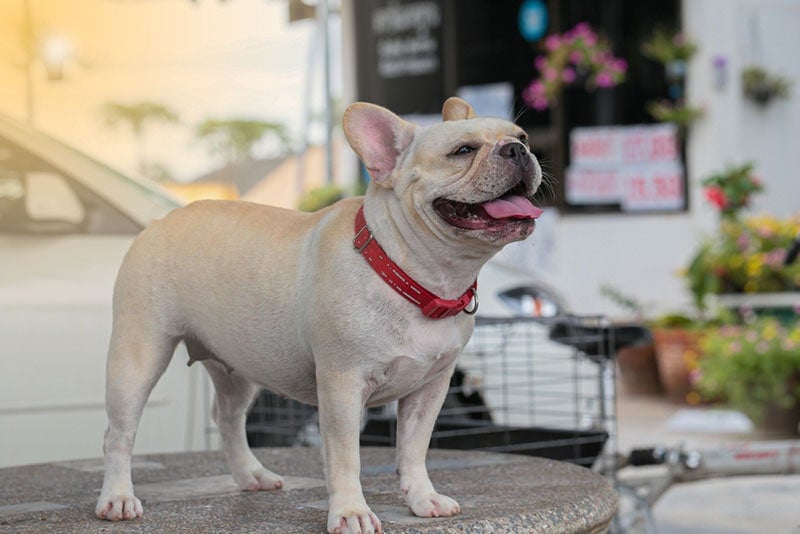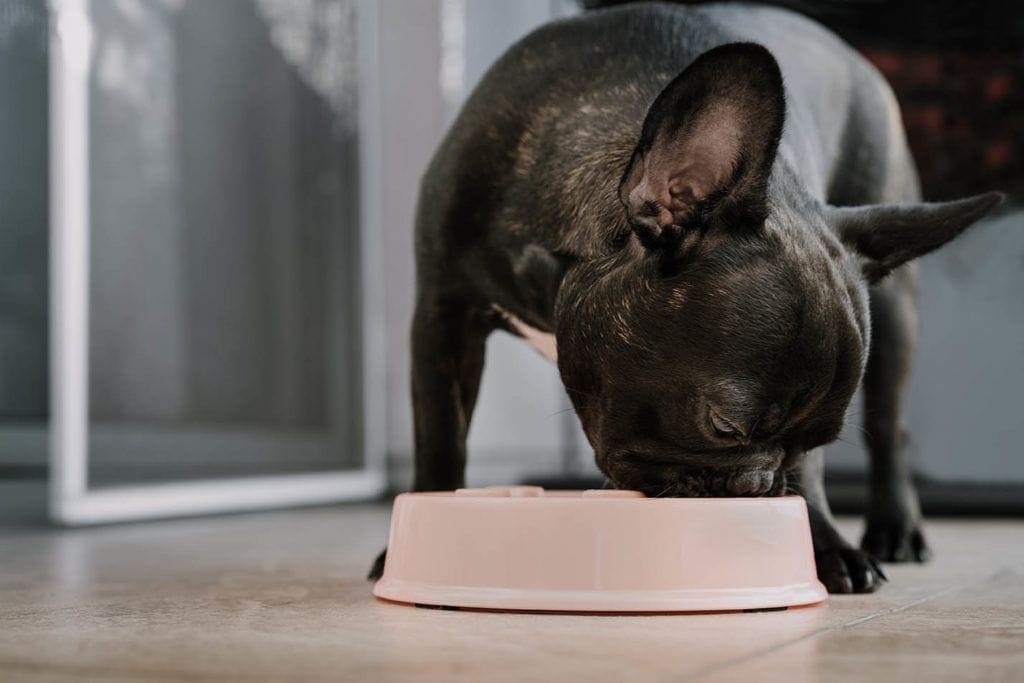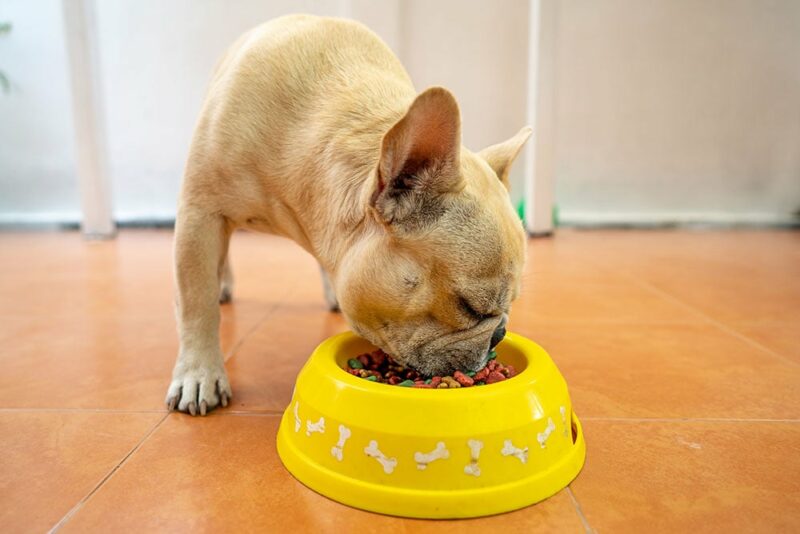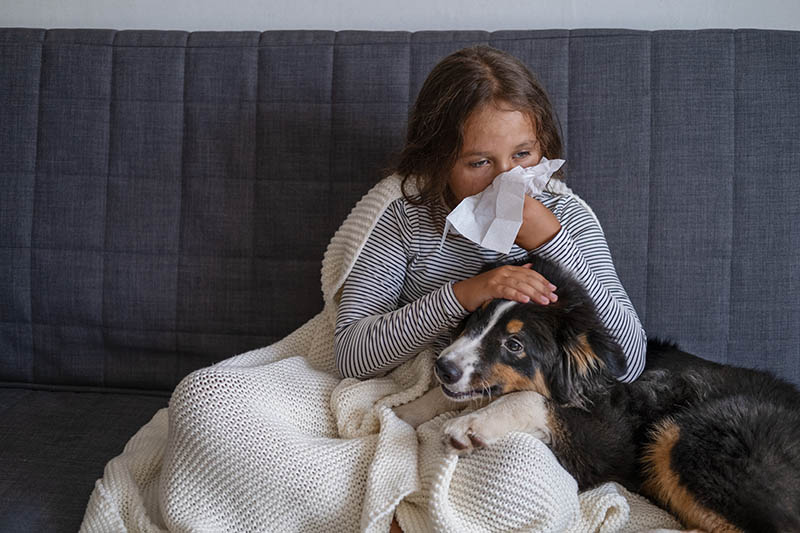Why Do Frenchies Fart So Much? 8 Vet-Approved Common Reasons
By Jessica Kim
Updated on

This article has been fact-checked by a qualified veterinarian using information available at the time of review. Veterinary medicine is continually evolving and changing. Dog owners are urged to discuss their dogs’ care with their veterinarian and this article should not be taken as a substitute for medical advice for your pet.
Click to Skip Ahead
French Bulldogs have risen significantly in popularity over recent years. These beloved dogs recently broke the Labrador Retriever’s 31-year reign as the most popular dog breed in the US and now sit at the number one spot as America’s favorite dog.
While Frenchies are adorable and charming, they can be high-maintenance pets due to their susceptibility to certain health conditions. Flatulence in Frenchies is common, and many Frenchie owners must learn to navigate this issue. There are several reasons why Frenchies may fart frequently, and some are minor, while others can be serious. Here are some common reasons why Frenchies may fart and how you can address these issues.
The 8 Common Reasons Why Frenchies Fart So Much
1. Brachycephalic Dog
One of the main reasons why Frenchies tend to fart so much is because they’re a brachycephalic dog breed. Brachycephalic dogs have short snouts or flat faces, and their facial structure can affect their ability to breathe. In general, brachycephalic dog breeds are more susceptible to flatulence because they tend to intake more air when they eat, drink and pant. This means that the air they swallow can cause them to become gassy and let out more farts. Being short-faced may lead to more than just flatulence; around 97% of brachycephalic dogs with respiratory problems also will have secondary gastrointestinal disease.1

2. Changes in Diet
Most causes of flatulence revolve around a dog’s food and diet. Sudden changes in diet can cause Frenchies to experience indigestion or an upset stomach. So, if you’re going to change your Frenchie’s food, it’s important to always do so in gradual increments. This will reduce the likelihood of causing gas, and your Frenchie will have an easier time adjusting to a new type of food or diet.
It’s recommended to start by replacing 25% of your Frenchie’s meal with new dog food. If they eat their meal for a couple of days without any issues, you can add more of the new food and have it take up 50% of their meal. After a couple more days, the new dog food can take up 75% of your Frenchie’s meal. Wait a few more days before completely switching over to the new dog food.
3. Digestibility of Diet
Ingredients that are poorly digestible such as wheat, soybeans, beet pulp, and navy beans increase flatulence in dogs because they become fuel for bacterial fermentation leading to the production of gasses. So, make sure to check a dog food recipe’s ingredient list to see if it includes foods that cause gassiness in dogs. Feeding more digestible diets will reduce the gassiness in most dogs.

4. Eating Dairy and Milk Products
Dairy and milk products are known to cause gas in Frenchies because it’s common for dogs to be lactose intolerant. Many Frenchies will enjoy drinking milk and eating cheese, ice cream, whipped cream, and other dairy products. They’ll often continue to eat them, even if it causes gassiness or digestive issues. So, it’s important to refrain from feeding them dairy products because it’s unlikely that they’ll stop eating them on their own.
5. Eating Spoiled Food
Frenchies are known to be foodies that enjoy eating, and they often have dietary indiscretions. They can end up gobbling down food that they find on the floor or on the ground while they’re outside on a walk. Some of this food could have been left out for days and have spoiled, which could then cause gastrointestinal upset.
If your Frenchie has eaten spoiled food and has gastrointestinal upset, they can experience vomiting and diarrhea on top of increased flatulence. If you suspect that your Frenchie has eaten spoiled food, make sure to contact your veterinarian to ensure that they receive the proper treatment.

6. Inflammatory Bowel Disease (IBD)
Frenchies are at higher risk of inflammatory bowel disease (IBD). IBD refers to chronic inflammation in the intestinal tract. Common signs of IBD include increased flatulence, chronic diarrhea, and weight loss.
It can be difficult to figure out the cause of IBD in dogs. However, most dogs require a diet change or medication. If your Frenchie experiences chronic diarrhea or vomiting along with frequent farts, make sure to have them examined by your veterinarian as they are unwell.
7. Intestinal Parasites
Intestinal parasites can wreak havoc in your Frenchie’s digestive system. Internal parasites can be particularly dangerous for Frenchie puppies, as they can severely affect their growth and development. Dogs with intestinal parasites can experience excessive intestinal gas, vomiting, and diarrhea. Routine deworming treatments or fecal exams will help prevent intestinal worms.

8. Other Gastrointestinal Disease
Intestinal bacterial, viral, cancerous, inflammatory and pancreatic disorders can all lead to the increased presence of gas in the intestines. If your Frenchie has any signs of ongoing vomiting, diarrhea, not wanting to eat, or weight loss, there is likely to be a health issue underlying their flatulence. A veterinary visit is warranted to look into gastrointestinal problems; some may be easily identified and treatable whereas others require specific tests to diagnose. As a starting point your veterinarian may recommend blood tests, imaging, or fecal tests.
What to Do If Your Frenchie Farts Frequently
Most causes of farting in Frenchies are mild. However, there’s always the chance that there’s a serious underlying medical condition. So, it’s best to get your Frenchie examined by your veterinarian if you notice that they’re farting frequently. Your veterinarian can do a physical exam and run diagnostic tests to determine the cause of the farting.
If your veterinarian determines that nothing serious is causing the farting, they may provide suggestions to help reduce the farting. You may need to change their diet and feed them dog food that contains easily digestible ingredients or has a sensitive stomach formula. You can also ask your veterinarian if it’s appropriate to add probiotic supplements to your Frenchie’s diet. Make sure to avoid feeding your Frenchie table scraps and human snacks, as they can contain ingredients that trigger gassiness.
Sometimes, getting your Frenchie to slow down with their meals can reduce flatulence. Slower eating can prevent them from inhaling big gulps of air. If your Frenchie’s a fast eater, you can try feeding their meals in slow feeder bowls. Treat dispensing toys are also effective in slowing down eating.

Conclusion
Farting is common for Frenchies, and many Frenchie owners have to make some lifestyle adjustments to reduce gassiness. Before making any changes, make sure to schedule an appointment with your veterinarian to determine the cause of the gassiness. Keep in mind that making certain changes to diet and eating habits can reduce the frequency of farting. However, letting out some gas is common for most Frenchies, and it may just be a normal part of their lives.
Featured Image Credit: Jantanee Boonkhaw, Shutterstock














